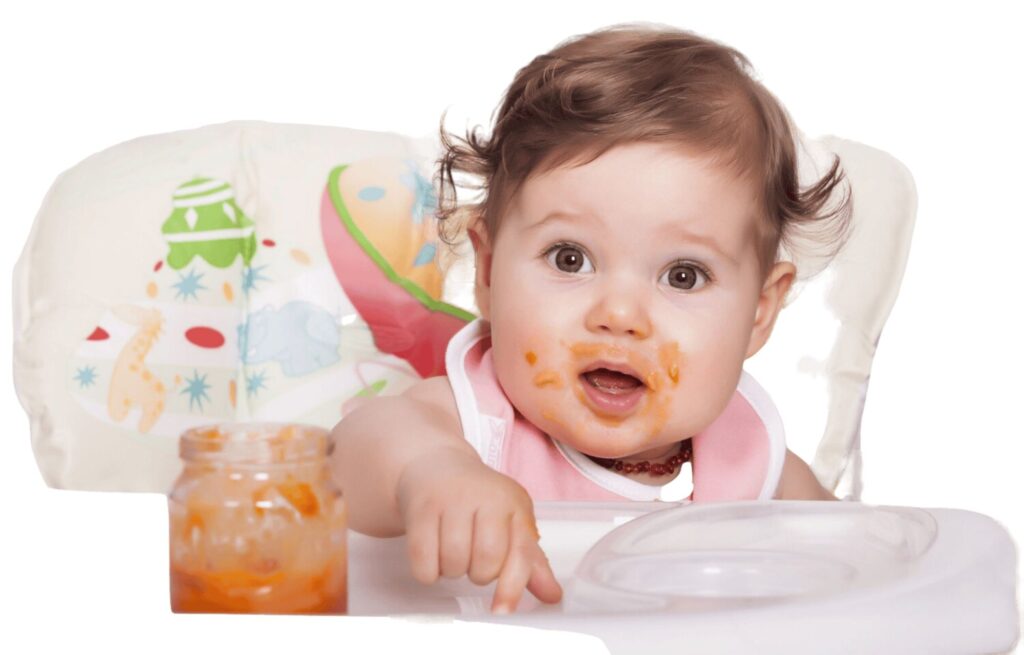When to start solid food for babies?
Introduction: Welcoming a new member to the family is a joyous occasion, and as your baby grows, so does the excitement of introducing them to solid foods. While this transition is a significant milestone, it’s crucial to determine the right time to start and navigate this new chapter with confidence.
Recommended Age for Starting Solid Foods: Pediatricians generally recommend introducing solid foods between four to six months of age. However, it’s essential to consider individual developmental milestones. Every baby is unique, and signs of readiness can vary.
Understanding Baby’s Readiness: Before diving into the world of solid foods, observe your baby’s motor skills development. Can your baby hold their head up steadily and sit with support? Additionally, watch for signs of interest in food, such as eyeing your plate during meals.
Types of Solid Foods: Begin with single-ingredient foods like rice cereal or oatmeal. Gradually introduce different food groups, focusing on nutrient-rich options. This helps in identifying any potential allergies or sensitivities.
Choosing the Right Time of Day: Consider offering solid foods during a time when your baby is calm and slightly hungry. Some parents prefer morning feedings, while others find evenings more suitable. Gauge your baby’s hunger cues and choose accordingly.
Baby-Led Weaning vs. Traditional Spoon-Feeding: Explore different feeding approaches like baby-led weaning or traditional spoon-feeding. Each method has its pros and cons. Pay attention to your baby’s preferences and adapt your approach accordingly.
Common Foods to Start With: Rice cereal and oatmeal are excellent starting points. Gradually introduce pureed fruits and vegetables, providing a spectrum of flavors and textures. This lays the foundation for a diverse palate.
Introducing Allergenic Foods: Take a gradual approach when introducing allergenic foods like nuts and eggs. Monitor your baby for any allergic reactions and consult your pediatrician if you have concerns.
Avoiding Choking Hazards: Consider the texture of the food and ensure proper preparation to avoid choking hazards. Pay attention to size and consistency, making adjustments as your baby progresses.
Transitioning to a Variety of Textures: As your baby becomes more accustomed to solids, gradually introduce a variety of textures. Encourage self-feeding, fostering independence and fine motor skills.
Signs That Baby Is Ready for Stage 2 Foods: Increased appetite and improved motor skills are signs that your baby is ready for more complex textures and flavors. Monitor their cues and make adjustments accordingly.
Dealing with Challenges: Fussiness and refusal are common challenges. Exercise patience and persistence, offering a variety of foods to identify your baby’s preferences.
Ensuring a Balanced Diet: Incorporate different food groups to ensure a balanced diet. Include fruits, vegetables, grains, and proteins to meet your baby’s nutritional needs.
Hydration During Solid Food Introduction: Introduce water as you begin solid foods. Proper hydration is crucial for overall health, and it complements the nutritional value of solid foods.
Celebrating Milestones: Celebrate each milestone, no matter how small. Keep track of your baby’s progress, and gradually expand their food choices as they grow.
Conclusion: The introduction of solid foods is a remarkable journey filled with exploration and growth. Pay attention to your baby’s cues, celebrate their milestones, and savor the joy of nourishing their developing taste buds.
FAQs
When can I start introducing solid foods to my baby?
- Pediatricians generally recommend starting solid foods between four to six months of age. However, individual developmental milestones should also be considered.
How do I know if my baby is ready for solid foods?
- Look for signs of readiness, such as improved motor skills, the ability to sit with support, and a keen interest in food during family meals.
What are common first foods for babies?
- Common first foods include rice cereal, oatmeal, and pureed fruits and vegetables. These options help in identifying potential allergies or sensitivities.
How can I prevent choking hazards when introducing solid foods?
- Consider the texture and size of the food, ensuring it is appropriate for your baby’s developmental stage. Always supervise your baby during meals.
How can I deal with my baby’s fussiness or refusal of solid foods?
- Fussiness and refusal are common challenges. Be patient, offer a variety of foods, and pay attention to your baby’s preferences as they develop.

